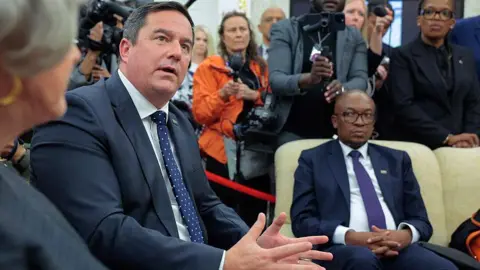In a recent meeting that was intended to alleviate existing tensions between the United States and South Africa, President Donald Trump took a surprising turn with comments that put South African President Cyril Ramaphosa on the defensive. During a live news conference, Trump accused South Africa of “persecuting” white farmers, specifically citing claims of a supposed “white genocide” in the country. This assertion comes amidst heightened scrutiny over the treatment of Afrikaners, the descendants of European settlers in South Africa, and has been a subject of political contention for years.
The situation escalated when Trump displayed a video during the news conference that depicted a row of crosses lining a road, which he claimed represented burial sites for murdered white farmers. This footage, Trump admitted, was unverified and the specific location in South Africa was unknown to him. While the video aimed to support his claims regarding white farmers being targeted, it was widely discredited as part of a protest against violence in the country rather than a genuine representation of genocide.
This confrontation unfolded a week after reports emerged of South Africa granting asylum to nearly 60 Afrikaners, a move that provoked a backlash from the South African government. In response, President Ramaphosa had hoped to foster a spirit of cooperation during his visit, highlighting the potential for improved trade relations between the two countries. However, with recent tariffs imposed on South African exports to the U.S. expected to increase, the stakes in their discussions were notably high.
Trump’s inflammatory remarks not only overshadowed the diplomatic discussions but also alienated Ramaphosa, who was expecting a positive reception. To bolster his appeal, the South African president brought along prominent figures, including two internationally known South African golfers and a substantial book about the golf courses of South Africa as a gift for Trump. Yet, the reality of the meeting quickly shifted from jovial exchanges to a tense dialogue.
As the discussion progressed, Trump repeatedly questioned the validity of South African claims regarding the treatment of white farmers, insisting that rights to land were being mishandled. He urged Ramaphosa for an explanation about the alleged crimes against white individuals in South Africa, which have been broadly classified as fabrications by many observers and critics. Ramaphosa, maintaining his composure, emphasized the democratic nature of South Africa that permits diverse voices but clarified that these views do not reflect government policies.
The narrative surrounding the treatment of farmers has long been politically charged in South Africa, affected by the historical context of land dispossession and racial inequality. While Ramaphosa’s administration has introduced laws aimed at land expropriation without compensation, he reassured Trump that the government takes the issue seriously and is considerate of all citizens, regardless of race.
In response to Trump’s assertions regarding land seizure and violence, Ramaphosa highlighted that criminality affects all South Africans, regardless of race, and pointed out the misconceptions surrounding the narrative that has been carefully crafted by right-wing groups both domestically and internationally.
As the meeting drew to a close, it became evident that while both leaders expressed a desire to work toward a cooperative future, the encounter was marred by conflicting narratives and unresolved racial tensions that continue to shape South Africa’s socio-political landscape. Ramaphosa’s appeal to Trump leaned on mutual respect and the legacy of Nelson Mandela’s commitment to reconciliation, underscoring the importance of dialogue in addressing these contentious issues. The fallout from such diplomatic encounters is a reminder of the delicate nature of international relations, particularly when interwoven with deep-seated historical grievances and identity politics.



